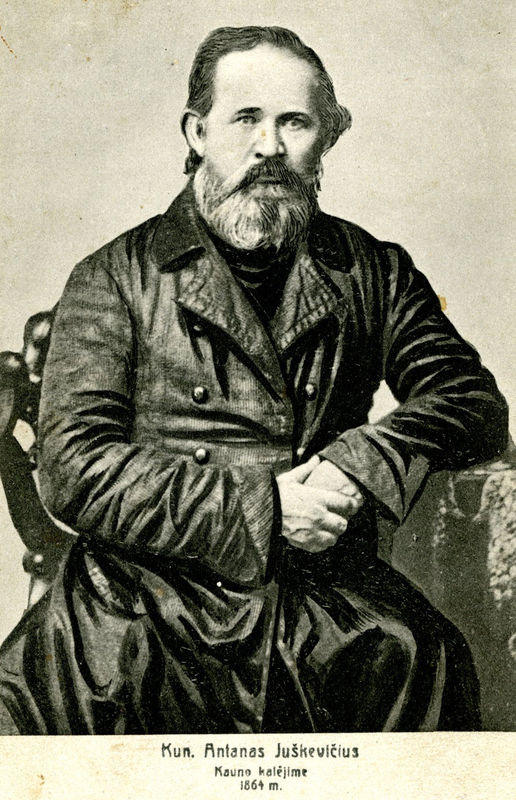Antanas Juška
 Antanas Juška (; 16 June 1819 – 1 November 1880) was a Lithuanian Roman Catholic priest known for his lifelong study of Lithuanian folk traditions. For about three decades, he observed the Lithuanian people, their traditions, and recorded their songs and vocabulary. Juška recorded about 7,000 Lithuanian folk songs, including about 2,000 songs with melodies, and wrote a 70,000-word Lithuanian–Polish dictionary. These works provide a wealth of information of the 19th-century Lithuanian life. His works were partially published with the help of his elder brother Jonas Juška.
Antanas Juška (; 16 June 1819 – 1 November 1880) was a Lithuanian Roman Catholic priest known for his lifelong study of Lithuanian folk traditions. For about three decades, he observed the Lithuanian people, their traditions, and recorded their songs and vocabulary. Juška recorded about 7,000 Lithuanian folk songs, including about 2,000 songs with melodies, and wrote a 70,000-word Lithuanian–Polish dictionary. These works provide a wealth of information of the 19th-century Lithuanian life. His works were partially published with the help of his elder brother Jonas Juška.With the help of his brother Jonas, Juška attended Kražiai College and later transferred to the Vilnius Theological Seminary. He was ordained as a Catholic priest and later worked in various locations in Lithuania – , Obeliai (1845), and Zarasai (1846–1849), Ukmergė (1849–1855), Pušalotas (1855–1862), Lyduvėnai (1862), Vilkija (1862–1864), Veliuona (1864–1871), Alsėdžiai (1871–1879). During the failed Uprising of 1863, he was arrested and imprisoned for nine months on suspicions of sympathizing with the rebels. He died in Kazan in 1880.
Juška became interested in Lithuanian folk culture and language while living in Ukmergė but his most productive period was while living in Veliuona. He collected Lithuanian vocabulary and folk songs directly from the people. He was particularly interested in wedding traditions – he recorded numerous wedding songs and wrote a separate study on Lithuanian wedding traditions. He wrote down the songs as they were performed – i.e. preserving nuances of the dialects. He also noted who were the singers, which was a relatively new development in folklore studies. At about 7,000 songs, it was by far the largest collection of Lithuanian folk songs at the time (previously, a total of about 800 Lithuanian songs were published). However, only about 2,800 of them were published and the rest were lost during World War I.
When Jonas Juška moved to Kazan and became acquainted with professor Jan Baudouin de Courtenay in 1875, the brothers began working on publishing the vast material collected by Antanas. Due to the Lithuanian press ban implemented as part of the larger Russification efforts after the Uprising of 1863, Lithuanian texts could only be printed in the Cyrillic script and not the traditional Latin alphabet. However, with the help of Baudouin de Courtenay, Juškas managed to convince the University of Kazan to print three volumes of Lithuanian songs (a total of 1,586 songs) in 1880–1882. They also convinced the Russian Academy of Sciences to get a special exemption from Tsar Alexander II of Russia to publish a collection of 1,100 wedding songs in 1883. Melodies of 1,780 songs were published largely due to the efforts by Baudouin de Courtenay in 1900.
Juška also wrote three dictionaries – 7,000-word Polish–Lithuanian (around 1854), 6,000-word Latvian–Lithuanian–Polish (1875), and 70,000-word Lithuanian–Polish dictionaries. The first two dictionaries were never published. His main dictionary was prepared not based on words picked out from published texts but from the local vernacular. He recorded words in sentences and explained their meaning in Lithuanian and only then translated them to Polish (later, Russian was added so that the dictionary could be published). Thus, he wrote an explanatory dictionary of the colloquial language. After Juška's death, his dictionary was edited by numerous linguists, including his brother Jonas, Vatroslav Jagić, Jonas Jablonskis, Kazimieras Būga, but the work was very slow and only three volumes up to the word ''kuokštuotis'' were published over the next four decades (in 1897, 1904, and 1922). Provided by Wikipedia
1
Contributors: ';
“...Juška, Antanas, 1819-1880....”
Book
2
Contributors: ';
“...Juška, Antanas, 1819-1880....”
Book
3
Contributors: ';
“...Juška, Antanas, 1819-1880....”
Book





